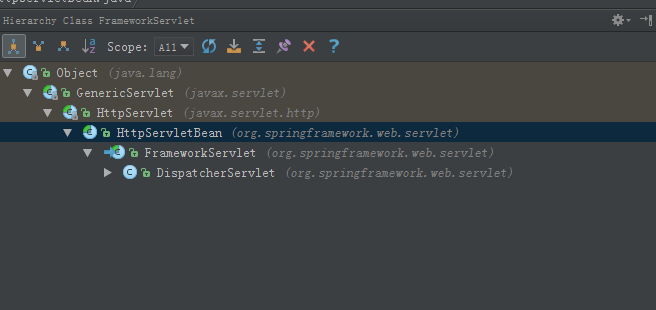Spring之SpringMVC(源码)启动初始化过程分析
1.说明
SpringMVC作为Spring提供的MVC实现,可以实现与Spring的天然无缝联合,因为具有很广泛的用途。具体的关于SpringMVC的处理流程逻辑我在这里就不在赘述了。还是来通过源码来追述下SpringMVC的启动过程。
2.入口
DispatcherServlet作为SpringMVC的前端控制器,具有很核心的地位。来看下它的继承结构。

可以看到DispatcherServlet依次继承了GenericServlet、HttpServlet、HttpServletBean、FrameworkServlet.由于DispatcherServlet是继承了HttpServlet,所以它的初始化入口应该是HttpServlet的init()方法,Web容器启动时将调用它的init方法init()方法具体做了什么工作。
public final void init() throws ServletException {
if (logger.isDebugEnabled()) {
logger.debug("Initializing servlet '" + getServletName() + "'");
}
// Set bean properties from init parameters.
try {
PropertyValues pvs = new ServletConfigPropertyValues(getServletConfig(), this.requiredProperties);
BeanWrapper bw = PropertyAccessorFactory.forBeanPropertyAccess(this);
ResourceLoader resourceLoader = new ServletContextResourceLoader(getServletContext());
bw.registerCustomEditor(Resource.class, new ResourceEditor(resourceLoader, getEnvironment()));
initBeanWrapper(bw);
bw.setPropertyValues(pvs, true);
}
catch (BeansException ex) {
logger.error("Failed to set bean properties on servlet '" + getServletName() + "'", ex);
throw ex;
}
// Let subclasses do whatever initialization they like.
initServletBean();
if (logger.isDebugEnabled()) {
logger.debug("Servlet '" + getServletName() + "' configured successfully");
}
}
注意这个方法是final,不能够被覆盖,它位于HttpServletBean中。它完成的功能有两个,第一个将将Servlet初始化参数设置到该Servlet中,第二个调用子类的初始化。
3.HttpServletBean的 initServletBean()
从上面可知,initServletBean方法主要用于子类的处理话过程。看下HttpServletBean的子类FrameworkServlet.看下具体的实现:
protected final void initServletBean() throws ServletException {
getServletContext().log("Initializing Spring FrameworkServlet '" + getServletName() + "'");
if (this.logger.isInfoEnabled()) {
this.logger.info("FrameworkServlet '" + getServletName() + "': initialization started");
}
long startTime = System.currentTimeMillis();
try {
this.webApplicationContext = initWebApplicationContext();
initFrameworkServlet();
}
catch (ServletException ex) {
this.logger.error("Context initialization failed", ex);
throw ex;
}
catch (RuntimeException ex) {
this.logger.error("Context initialization failed", ex);
throw ex;
}
if (this.logger.isInfoEnabled()) {
long elapsedTime = System.currentTimeMillis() - startTime;
this.logger.info("FrameworkServlet '" + getServletName() + "': initialization completed in " +
elapsedTime + " ms");
}
}
FrameworkServlet是SpringMVC的一个基础Servlet,通过它可以完成和Spring的整合。通过initServletBean()的代码,可知只要操作有两个initWebApplicationContext();和initFrameworkServlet();第一个完成了Web上下文的初始化工作:ContextLoaderListener 加载了上下文将作为根上下文(DispatcherServlet 的父容器),第二个则提供给子类进行初始化的扩展点:行容器的一些初始化,这个方法由子类实现,来进行扩展。。
我们来看下它是如何完成Web上下文的初始化工作 initWebApplicationContext(); 实现代码:
protected WebApplicationContext initWebApplicationContext() {
WebApplicationContext rootContext =
WebApplicationContextUtils.getWebApplicationContext(getServletContext());
WebApplicationContext wac = null;
if (this.webApplicationContext != null) {
//在创建的时候注入根上下文
wac = this.webApplicationContext;
if (wac instanceof ConfigurableWebApplicationContext) {
ConfigurableWebApplicationContext cwac = (ConfigurableWebApplicationContext) wac;
if (!cwac.isActive()) {
// The context has not yet been refreshed -> provide services such as
// setting the parent context, setting the application context id, etc
if (cwac.getParent() == null) {
// The context instance was injected without an explicit parent -> set
// the root application context (if any; may be null) as the parent
cwac.setParent(rootContext);
}
configureAndRefreshWebApplicationContext(cwac);
}
}
}
if (wac == null) {
// No context instance was injected at construction time -> see if one
// has been registered in the servlet context. If one exists, it is assumed
// that the parent context (if any) has already been set and that the
// user has performed any initialization such as setting the context id
wac = findWebApplicationContext();
}
if (wac == null) {
// No context instance is defined for this servlet -> create a local one
wac = createWebApplicationContext(rootContext);
}
if (!this.refreshEventReceived) {
// Either the context is not a ConfigurableApplicationContext with refresh
// support or the context injected at construction time had already been
// refreshed -> trigger initial onRefresh manually here.
onRefresh(wac);
}
if (this.publishContext) {
// Publish the context as a servlet context attribute.
String attrName = getServletContextAttributeName();
getServletContext().setAttribute(attrName, wac);
if (this.logger.isDebugEnabled()) {
this.logger.debug("Published WebApplicationContext of servlet '" + getServletName() +
"' as ServletContext attribute with name [" + attrName + "]");
}
}
return wac;
}
它首先通过Spring提供的工具类 WebApplicationContextUtils 获取Spring 的根上下文(ContextLoaderListener加载的)。主要操作有1.在创建该Servlet的时候注入根上下文,2.如果上下文为空,那么就查找已经绑定的上下文,如下所示
protected WebApplicationContext findWebApplicationContext() {
String attrName = getContextAttribute();
if (attrName == null) {
return null;
}
WebApplicationContext wac =
WebApplicationContextUtils.getWebApplicationContext(getServletContext(), attrName);
if (wac == null) {
throw new IllegalStateException("No WebApplicationContext found: initializer not registered?");
}
return wac;
}
第三个操作,如果没有找到相应的上下文,并指定父亲为ContextLoaderListener,手动创建一个
protected WebApplicationContext createWebApplicationContext(ApplicationContext parent) {
Class<?> contextClass = getContextClass();
if (this.logger.isDebugEnabled()) {
this.logger.debug("Servlet with name '" + getServletName() +
"' will try to create custom WebApplicationContext context of class '" +
contextClass.getName() + "'" + ", using parent context [" + parent + "]");
}
if (!ConfigurableWebApplicationContext.class.isAssignableFrom(contextClass)) {
throw new ApplicationContextException(
"Fatal initialization error in servlet with name '" + getServletName() +
"': custom WebApplicationContext class [" + contextClass.getName() +
"] is not of type ConfigurableWebApplicationContext");
}
ConfigurableWebApplicationContext wac =
(ConfigurableWebApplicationContext) BeanUtils.instantiateClass(contextClass);
wac.setEnvironment(getEnvironment());
wac.setParent(parent);
wac.setConfigLocation(getContextConfigLocation());
configureAndRefreshWebApplicationContext(wac);
return wac;
}
第四步,不管这个上下文是不是ConfigurableApplicationContext或者在构建的时候刷新过,都需要重新刷新上下文,完成一些初始化的工作。
第四步的实现是放到DispatcherServlet中的onRefresh实现的,具体来看代码,
@Override
protected void onRefresh(ApplicationContext context) {
initStrategies(context);
}
protected void initStrategies(ApplicationContext context) {
initMultipartResolver(context);
initLocaleResolver(context);
initThemeResolver(context);
initHandlerMappings(context);
initHandlerAdapters(context);
initHandlerExceptionResolvers(context);
initRequestToViewNameTranslator(context);
initViewResolvers(context);
initFlashMapManager(context);
}
它主要完成了控制器相关的配置工作,具体工作。。。。好多。。暂缓。
4.总结
SpringMVC初始化启动过程中做的事情比较简单,初始化 Spring Web MVC 使用的 Web 上下文并且指定ContextLoaderListener为父容器;还有就是上面代码所示的那样初始DispatcherServlet 使用的策略。
未完待续!!!!!!!!


 浙公网安备 33010602011771号
浙公网安备 33010602011771号